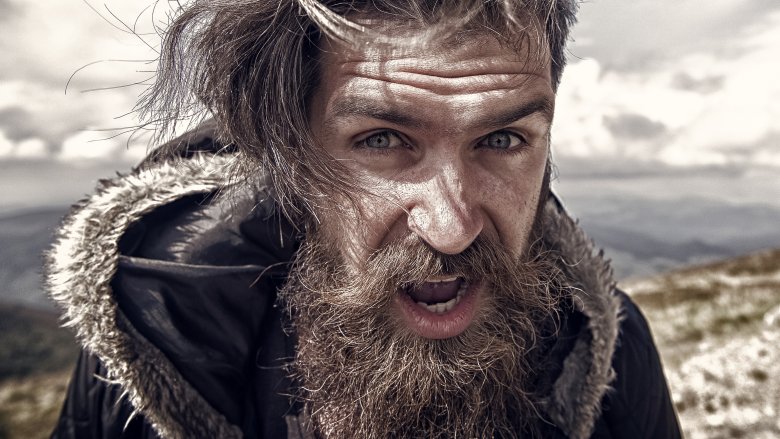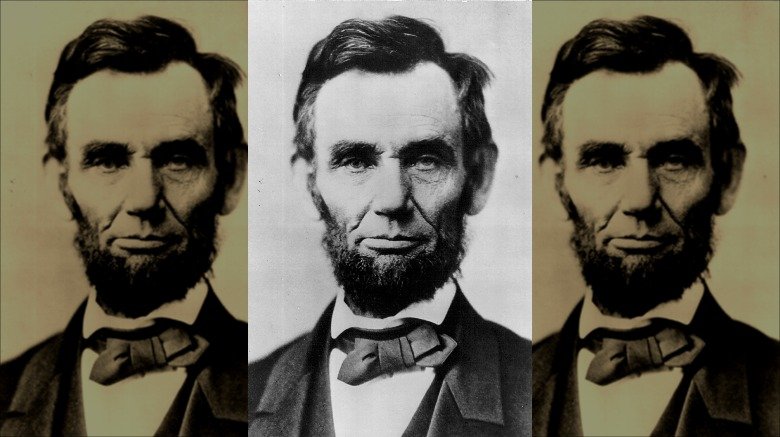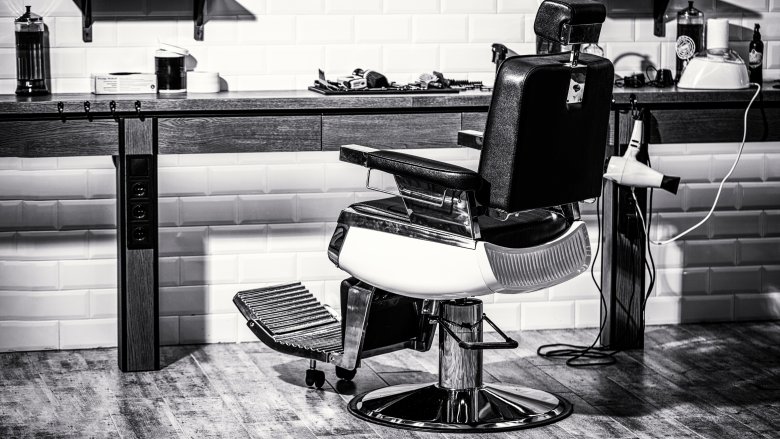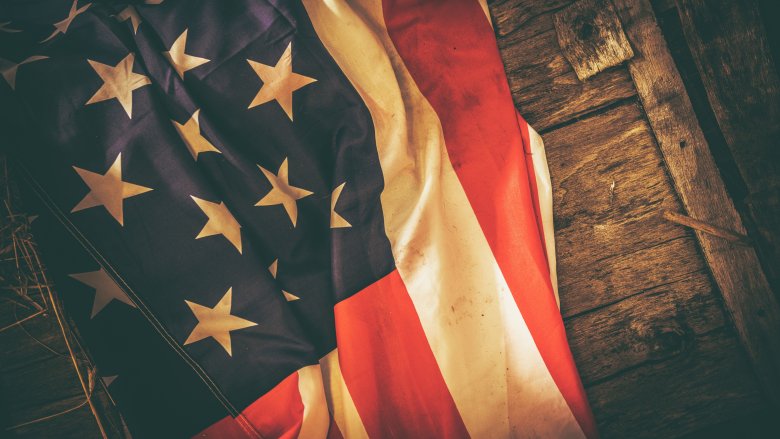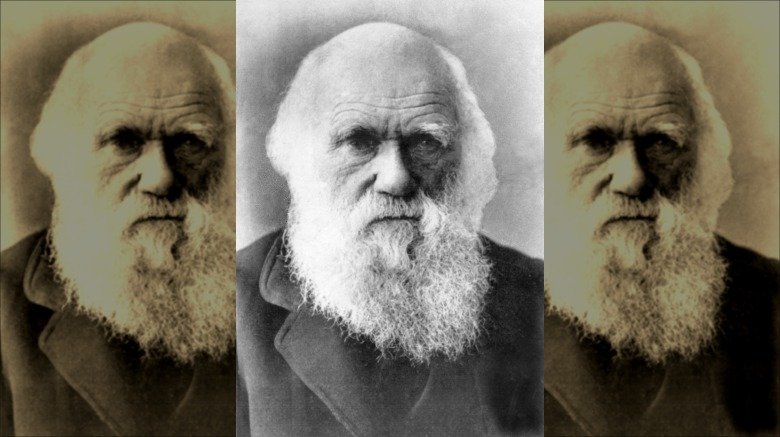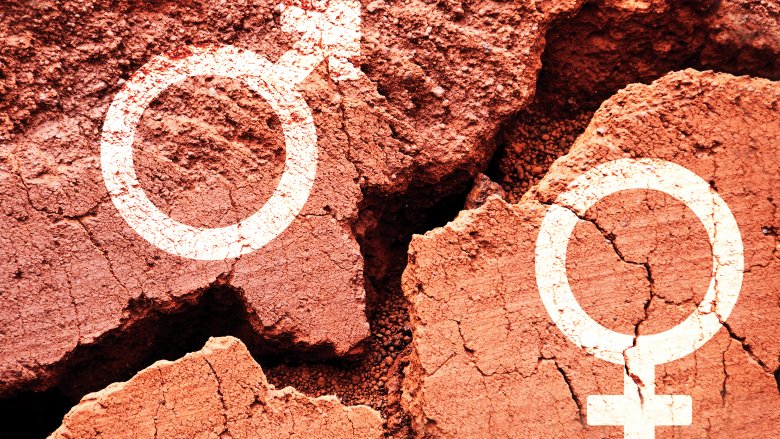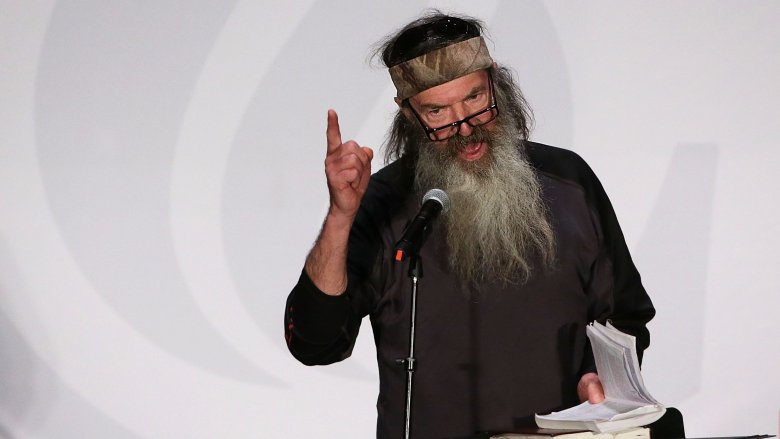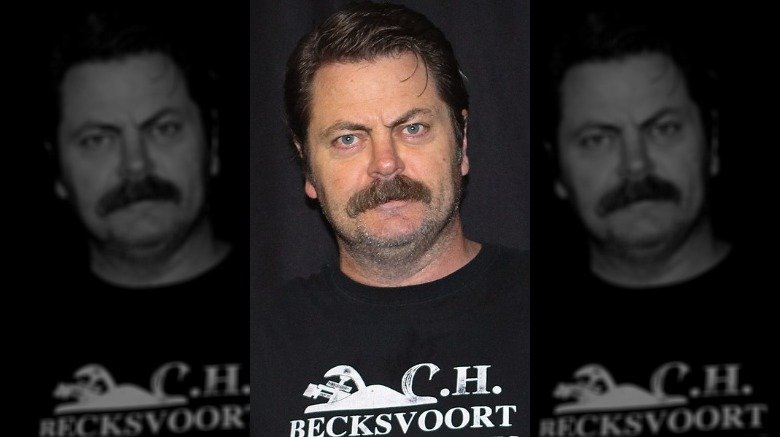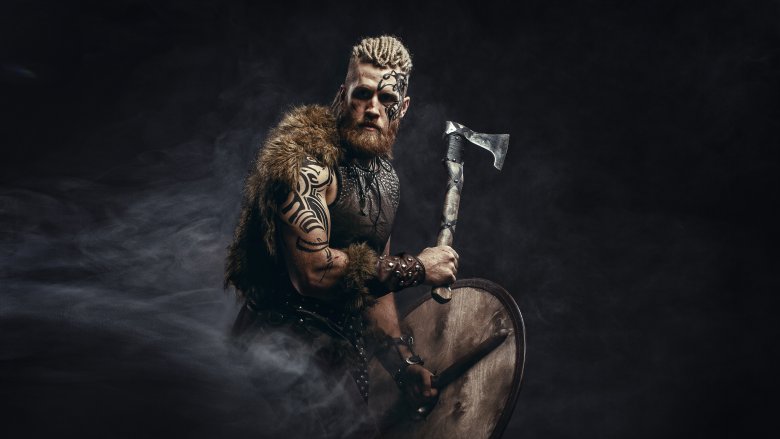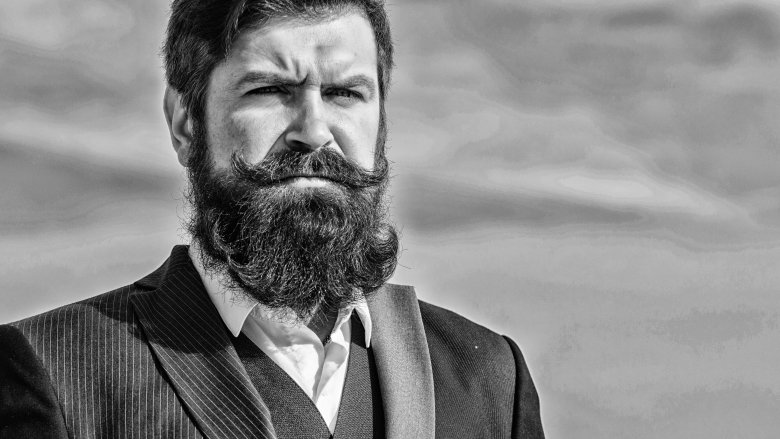The Dark History Of The American Beard
The history of personal grooming isn't just the story of how we humans once gussied up for a night on the town. Ancient Egyptians melted fragrant wax cones on their heads not just to smell (and look) awesome, but also to curry favor with the god of perfume, Nefertum, who was the guy you talked to if you wanted to live a long and happy life. In the 1500s, English aristocrats would dye their hair bright red and keep their skin ghostly pale. Sure, this bold fashion move was a smart way to curry favor with Queen Elizabeth I (who happened to be very fond of red) but it was also reputedly a way for Church of England followers to separate themselves visually from Catholics across Europe, who were predominantly dark-haired.
The point is, the history of personal fashion is rarely just about looks; there's almost always a deeper layer of meaning wound tightly around a society's most basic assumptions and beliefs. The American beard is no exception. From the nation's founding historical moments, the facial hair choices of American men reveal deep-seated attitudes about the most basic stuff that makes a civilization tick. So grab a beard comb, and let's dive face first into the bristly, dark depths of the history of the American beard.
Abe's beard was a cultural battleground
While the annals of American beard-lore don't accurately begin with political colossus and patron saint of beardies, Abraham Lincoln, he's probably the person most people will mention in a conversation about historically-significant facially hirsute Americans. Abe was a devotee of what we describe today as the neck beard (although a beard aficionado will tell you it's called a wreath beard).
Even in his day, Lincoln's beard was a matter of intense public debate, an article in The Appendix recounts. In 1860, Lincoln was clean-chinned, and still seeking election to the presidency. An 11-year-old supporter named Grace Bedell wrote to Abe, suggesting a beard might increases his chances. She explained that "all the ladies like whiskers and they would tease their husbands to vote for you." Improbably, Lincoln took her advice. He even made a point of meeting her in person to thank her for the suggestion. The press reported on it. Rival candidates mocked Lincoln for his unbecoming vanity. In 1860, long before social media, a presidential hopeful faced an optics and credibility issue — and it all revolved around his personal bewhiskerment choices. A beard changed Lincoln's face dramatically, transforming his weak chin into an imposing yet urbane facial feature. Lincoln seemed more authoritative bearded, but it also represented an endearing fallibility. It made him relatable. Right as the US was about to tear itself apart, a beard became a battleground for the future of the nation's national character.
The dark history of the barbershop
However, the dark history of the American beard begins much earlier, in the years immediately following the American Revolution. As described in The Atlantic, "in a new country that prized personal independence, service work seemed abhorrent to many white citizens. At the same time, the Revolution caused many American to rethink the morality of slavery, which lead to emancipation in the Northern states and waves of manumission in the South."
It was in this uneasy new culture and economy that many former slaves opted to become barbers. It's probably oversimplifying this historical turn of events to describe it as completely dark. After all, the noble art of barbering became an important cultural avenue for a disempowered and marginalized group of people to pull themselves out of poverty and obscurity. Moreover, while it was entrenched disempowerment that led them there, barbers occupied a strangely powerful and high profile position in society. Barbershops were considered places of civility — a kind of beardy town square, if you will. Nevertheless, for both better and worse the stereotype of the "black barbershop" gradually took hold in American culture and remained a prominent cultural touchstone for many generations.
The post-Revolutionary beard and racial tensions
The Atlantic article describes the cultural cache and sophistication of barbers: "refined in dress and graceful in movement, the best offered practical instruction in the gentlemanly arts. They were also expert conversationalists, engaging and entertaining their customers while they worked." Despite their influence, black barbers were frequently on the receiving end of racial prejudice. If their opinions became too strident or transgressive, customers might accuse them of overstepping racial boundaries, "with potentially disastrous consequences." The American beard of the post Revolutionary period told an awkwardly ambivalent story of cultural power, and rising up out of poverty in the face of entrenched inequalities. The barbershop of this era, and the hapless beard its existence was predicated on, was complicated. It was odd cultural theater. And it hints at an idea that has been repeated over millennia of human history: the trappings of fashionable civility are usually about a lot more than fashion.
The beard and U.S. exceptionalism
Around the same time as Lincoln's assent to bearded glory came another twist in the annals of beard-dom. Science was yielding more insight into germ theory, and suddenly "lack of beard" became a medical condition, not just in the US but throughout Europe. Alun Withey, a medical historian cited in a Smithsonian article, explains: "the Victorian obsession with air quality saw the beard promoted as a sort of filter. A thick beard, it was reasoned, would capture the impurities before they could get inside the body."
In the mid-1800s, the US had also entered an active period of expansion, and as described in The Atlantic, beards became synonymous with vigorous national health. Capturing a prevailing attitude of the day, the Atlantic article refers to an 1856 article in the New York tribute in which an anonymous "lady on beards" announced that "the bearded races are the conquering races." The Mexican-American War and successive waves of Native American relocation were fueled, in some part at least, by the notion that it was the national birthright of a virile nation. A beard was seen as the extension of a nation's soul, and like empire, it was thought that a beard should be expansive, tough and unapologetically unfettered by emasculating refinements. The giant bushy beard became a mark of superiority — over disease, yes, but also over less beardy nations.
The modern military beard
But the present day beard isn't tainted with the smoke of battle and the musky sweaty-funk of the conqueror, is it? Well, not to the same extent. But depending on whom you ask, it's there. This odd chapter begins around the turn of this century. Prior to the Noughties, your standard US military guy would have been clean-shaven. It wasn't just the cultural norm in the US military: it was protocol. Then 9/11 happened, and then-President George Bush launched an anti-terror campaign against the Middle East.
But this was not Operation Desert Storm, with its alleged "surgical strikes" from afar. US forces were down in the sand, getting heavily involved with local forces — and local culture. In cultures where masculinity was mandatory for getting a seat at the table, beards became a vital cultural passport for engagement with local forces. Accordingly, Green Berets, Seals, and Rangers were given approval by higher-ups to wear beards. An insider reporting for The New Tech Republic said, "It's difficult to overstate the cultural revolution this spurred within the service. Wearing a beard soon meant whatever one was doing must be of sufficient importance to buck the rule by which every other solider had been governed since basic training." Wearing a beard meant you were the tip of the spear. The modern military beard is a far cry from the US exceptionalism beard of yore. But to many, it still means you stand apart — that you've seen dark things.
Beards also played a role in gender politics
The American beard has also had some dark domestic implications. Let's jump back to the latter half of the 1850s, where a rapidly escalating gender war was taking hold in the US. As US History Scene reports, newspapers of the day began to refer to the "Beard and Moustache Movement," short-hand for men who militantly opposed new-fangled ideas around giving women rights and a vote. Men in this era (not just in the US but throughout Europe as well) began to distinguish themselves more starkly from women.
Clothing styles shifted away from the elegant, closely tailored, and courtly look of early nineteenth century gentility, to the more boxy and girth-happy look of the three piece suit. And of course, beard styles changed too, becoming hairy ammunition in a seemingly intractable war over gender. Doubling down on the bushiness with big beards and colossal side whiskers was a way of showing one's masculine allegiance. The late nineteenth century was a reactive and charged era for gender politics in the US, and the starkness of the beard's symbolism for gender conservatism arguably hit its peak in the antebellum period. A beard meant you sided with conservatism, with maintaining the gender status quo, and — most of all — that you felt that men should be men and women should be women.
The "Duck Dynasty" beard
But that hirsute war over entitlement and rights is long since dead, right? Well, not really. You'll still hear odd cultural echoes if you place your ear to the ground and listen hard enough. In 2012, a reality TV show called Duck Dynasty burst onto A&E's airwaves. The show followed the lives of the Robertson family, and the dramas of running a successful duck hunting accessories business. As a backdrop to the main storyline, the male protagonists were finding their cultural way in a world that was rapidly changing.
Duck Dynasty became a phenomenon. All heavily bearded, the men of the Robertson clan are about as visually masculine as our species can achieve. They're also hard people to unequivocally categorize. Self-proclaimed "redneck millionaires," the protagonists of Duck Dynasty embrace their rustic roots while rising above the poverty with which the label "redneck" is often synonymous. They were rapidly embraced as conservative role models, with their down home Southern values, devoutly Christian beliefs, and traditional views on acceptable roles for men and women. Yet they also extolled a basic, apolitical love of land and just letting people live their lives how they want. The big, bushy Duck Dynasty beard may echo the untamable, conservative, maverick beard of the mid-19th Century US, but the symbolism is more nuanced and layered now. The darkness lies more in the furious cultural debate surrounding what Duck Dynasty beards mean.
The many-chinned hydra of modern-day bearditude
So what does all this show us? The sociopolitical chinscape of beards has always been complex and value-laden, but over time, it seems to have become more complex. In the mid-19th century, how a dude decorated his chin was usually the product of just a few social tensions. It might have been a reaction for or against female roles, for example. Or, in the case of the infamous black barbershop, it may have been a way for some people to reassert the comfortable status quo before everything changed. Whatever it was though, it could be fairly neatly summarized. Like a well-sculpted beard, it had defined edges. Today, beards are conceptually fuzzy. The modern day American beard has many faces.
First, there's the benevolent beard face, epitomized by the popular charity, Movember. A gentle and socially aware facial adornment, the prototypical Movember beard (or mustache) is a mere shadow of its trailblazing bushy ancestor of yesteryear — not necessarily a bad thing! The Movember beard is a symbol for manning up and starting those awkward conversations that need to be had about mental and physical well-being. It is a benign and non-militant facial accessory, cheerfully acknowledging the challenges of masculinity without getting all up in anyone's bidness about it. It is a beard of good intentions and a cheerful, almost self-effacing masculinity.
The complicated symbolism of the Ron Swanson mustache
Then there's the modern re-envisioning of the patriot's beard — the gruff maverick, self assured in his national superiority and unimpeachable entitlement. This is embodied in the bushy upper lip of Ron Swanson, of Parks and Recreation fame. Yes, technically speaking, his was not a beard. But it could have been. That impenetrable lip-caterpillar of brooding maleness became, and for many still remains, iconic of modern masculinity.
The character on Parks and Recreation is a complicated man. He's driven by powerful emotion — even vulnerability at times — but he's almost absurdly inexpressive. Ron is a libertarian bureaucrat who loves the rule of law and who hates the stifling rigidity of government. The "fairer sex" perplexes him, and his worldview is dominated by how to be a man in the correct way, using a Pyramid of Greatness as a guide. Yet for all that, he's also driven to be deeply protective and nurturing at times. Ron Swanson retains enduring resonance, and his uniquely masculine, no-nonsense outlook is embodied in his mustache — so much so that when Nick Offerman shaved it off after the show ended there was a public outcry. Why? At least in part, it's because the Swanson mustache sings to the hearts of dudes who resonate with the same complexities.
It all gets back to hipsters
The third beard of the many-chinned hydra is the waxed, combed, and impeccably edged beard of the hipster. In the hipster beard, all the philosophical and political ambivalence of the Swanson mustache is writ large in fashion form. The hipster beard is an assertion of masculinity, and a statement of gentile vanity. It's a counter-cultural barbaric roar against fashion while playing straight into fashion's hands. Ultimately, the hipster beard is oddly ironic. Peter Furia, a hipster documentarian, had this to say of hipsters on NPR: "What's funny is that people who aren't hipsters generally express distaste for them and those who appear to be hipsters hate to be identified as such. Everybody hates hipsters ... especially hipsters. And the ironic part is that hipsters' opposition to pop culture has become pop culture." If you apply that idea to facial hair preference, the hipster beard is perhaps an ironic statement — a sarcastic statement, even — about masculinity.
Just like beard fashion, ideas tend to experience endless progression, regression, and eternally restless reinvention. The darkness of the beard today is perhaps more a grayness — an ambivalence of what it means to be masculine now that we know having a Y chromosome and white skin shouldn't be a ticket to entitlement. The foppish hipster beard could simply be about wearing that ambivalent ironic statement about masculinity right on your chin, with the added bonus being that it's a great way to strain one's kale and broccoli soup.
The current State Of Beard
So, what is the current State of Beard for humans as a species? Beards have always been more than a handy method for preventing unwanted flies from entering one's mouth while plundering a Saxon village. Viking conquerors were arming themselves with an arsenal of beard grooming tools, including a standard issue bone comb, which they'd take into battle should their manly foliation become befouled with mud or gore. A well kept beard was a symbol of self-respect and the pride of any pillaging barbarian about town. The elegantly trimmed and maintained facial confections of the gentleman of the Renaissance was considered a rite of passage from boyhood to manhood (which makes more sense when you consider that until the 17th century, it was believed that beard hair was generated by the body as a result of having overheated testicles).
The point is, beards are gestalt. They've always represented something more than the sum of their bristles. And they likely always will. The modern American male's chinscape is a cultural war zone. At stake is not just our modern take on masculinity, but the very stories we tell one another about what it means to be civilized.
Do beards have a future?
Perhaps ultimately it all boils down to evolution. As reported in BBC Science, researchers have found that men with beards are perceived as older and stronger. Moreover, when presented with an angry face, bearded men are perceived as being more angry than a male with a clean-shaven chin. Perhaps as a species, we're just hard-wired to give a guy with a beard a plus 10 to intimidation? Evolutionary biologists point out that dominance over male rivals can act as a decisive short-cut to mating opportunities, citing as genetic evidence the fact that around eight percent of Asian men are descendants of Genghis Khan.
But age, strength and aggression aren't the decisive factors today that they may have been when Genghis was strutting his stuff through present-day Asia (making a horde of mini-Genghises left and right). In fact, if anything, modern societies tend to value youth, sociability, and education. It begs the question, are beards on the wrong side of evolutionary history? A few generations from now, will the idea of an imposing face of bristly hair be considered laughably uncouth? Perhaps. But the American beard will bristle its way through history for some time yet.
